Machine Learning and Applications

The discipline of machine learning is working to develop computer algorithms and architectures that have the ability to be trained and to autonomously learn and make predictions from the vast amount of data available to current computing systems. The curriculum for the ECE MEng with an emphasis in Machine Learning and Applications covers a wide variety of fundamental coursework and the relevant project experience that can lead to a career requiring state-of-the-art knowledge in machine learning. Such career application areas are increasingly varied—whether it involves developing the algorithms and software to learn from and analyze medical data, or to model and predict financial markets, or to develop autonomous vehicles, or hundreds of other technologies driven by current industry and government application areas.
Courses
| No. | Course Name | Instructor | Location |
|---|---|---|---|
| ECE 5464 | Applications of Machine Learning | Creed Jones | Northern Virginia/Blacksburg/Virtual |
| ECE 5424G | Advanced Machine Learning (3C) | Paul Ampadu/Joseph Wang | Northern Virginia |
| No. | Course Name | Instructor | Location |
|---|---|---|---|
| ECE 5454 | Optimization Techniques for Electrical and Computer Engineering (3C) | Guoqiang Yu | Northern Virginia |
| ECE 5474 | Reinforcement Learning (3C) | Thinh Doan | Northern Virginia/Blacksburg/Virtual |
| ECE 5554 | Computer Vision (3C) | Jason Xuan/Creed Jones | Northern Virginia/Blacksburg |
| ECE 5605 | Stochastic Signals and Systems (3C) | Guoqiang Yu | Northern Virginia |
| ECE 6425 | Trustworthy Machine Learning (3C) | Ruoxi Jia | Northern Virginia/Blacksburg/Virtual |
| ECE 6524 | Deep Learning (3C) | Jason Xuan | Northern Virginia |
| ECE 6554 | Advanced Computer Vision (3C) | Jason Xuan | Northern Virginia |
| No. | Course Name | Instructor | Location |
|---|---|---|---|
| ECE 5444 | Advanced Technological Singularity (3C) | JoAnn Paul | Online/Northern Virginia |
| ECE 5480 | Cybersecurity and the Internet of Things (3C) | Kendall Giles | Online/Northern Virginia |
| ECE 5585 | IT Security and Trust I (3C) | Randy Marchany | Online |
| ENGR 5004 | The Systems Engineering Process (3C) | A. Salado Diez | Online |
| ISE 5164 | Transfer and Application of Emerging Technology (3C) | Ken Harmon | Online/Northern Virginia |
| ISE 5174 | Engineering Program and Project Management (3C) | Ken Harmon | Online/Northern Virginia |
| No. | Course Name | Instructor | Location |
|---|---|---|---|
| ECE 5944 | Seminar (1C) | Paul Plassmann | Blacksburg/Northern Virginia-Zoom/Recorded |
| No. | Course Name | Instructor | Location |
|---|---|---|---|
| ECE 5904 | Project and Report (3C) | Faculty Advisor | Northern Virginia |
Examples Include
| No. | Course Name | Instructor | Location |
|---|---|---|---|
| ECE 5374G | Alternate Energy Systems (3C) | Saifur Rahman | Online/Northern Virginia |
| ECE 5504 | Computer Architecture (3C) | JoAnn Paul | Online/Northern Virginia |
| ECE 5514 | Design of Systems on a Chip (3C) | JoAnn Paul | Online/Northern Virginia |
| ECE 5984 | Quantum Engineering (3C) | Vassilios Kovanis | Northern Virginia |
Sample Curriculum
Fall Semester
- ECE 5424G (3C) - Advanced Machine Learning
- ECE 5554 (3C) – Computer Vision
- ECE 5480 (3C) - Cybersecurity and the Internet of Things
- ECE 5504 (3C) – Computer Architecture (3C)
- ECE 5944 (1C) - Seminar
Spring Semester
- ECE 5444 (3C) - Advanced Technological Singularity
- ECE 5454 (3C) – Optimization Techniques for Electrical and Computer Engineering
- ECE 6524 (3C) – Deep Learning
- ECE 5984 (3C) – Quantum Engineering
- ECE 5944 (1C) - Seminar
Summer I & II
- ECE 5904 (3C) - Project and Report
- ECE 6554 (3C) – Advanced Computer Vision
Fall Semester
- ECE 5424G (3C) - Advanced Machine Learning
- ECE 5554 (3C) – Computer Vision
- ECE 5480 (3C) - Cybersecurity and the Internet of Things
- ECE 5504 (3C) – Computer Architecture (3C)
- ECE 5944 (1C) - Seminar
Spring Semester
- ECE 5444 (3C) - Advanced Technological Singularity
- ECE 5454 (3C) – Optimization Techniques for Electrical and Computer Engineering
- ECE 5605 (3C) – Stochastic Signals and Systems
- ECE 5984 (3C) – Quantum Engineering
- ECE 5944 (1C) - Seminar
Summer
- Summer Internship GRAD 5944 (for International Students)
Fall Semester
- ECE 5904 (3C) - Project and Report
- ECE 6554 (3C) – Advanced Computer Vision
Machine Learning and Applications – Washington, D.C. Metro Area Faculty Profiles

Professor of ECE
Dr. Paul K. Ampadu is a Professor of Electrical and Computer Engineering at Virginia Tech. Previously, he served for 13-years on the faculty of the University of Rochester, NY, and was for two years the Dr. Martin Luther King Visiting Professor of EECS at the Massachusetts Institute of Technology (MIT) in Cambridge, MA.
Prof. Ampadu’s research expertise is on reliable and secure energy-efficient embedded VLSI systems-on-chip (SoCs) and networks-on-chip (NoCs) for AI and IoT. His teaching has included all aspects of VLSI design, SoC, embedded systems, computer architecture, circuits and signals, and digital communication systems. Dr. Ampadu pioneered research in the use of information theoretic principles for joint reliability and energy-efficiency of networks-on-chip. He is the author of three books (with a fourth pending) and over 100 peer-reviewed journal and conference papers and technical presentations. He has served on the international program and technical committees of several IEEE and ACM conferences, has been on the editorial boards for the IEEE Transactions on VLSI, IEEE Design and Test of Computers, the Journal of Circuits, Systems, and Computers, and was guest editor for the Journal of Low-Power Electronics and Applications special issue on Resiliency, Robustness, and Reliability for VLSI Circuits and Systems. He has twice been elected to the IEEE Circuits and Systems Society Board of Governors and chaired its Young Professionals Program.
Ampadu, a Carnegie Foundation Fellow, has received numerous awards and honors including the National Science Foundation CAREER Award, a US Black Engineer of the Year Special Recognition, NASA Summer Faculty, and the Charles Drew Professor's Choice Award for innovative student mentoring. Ampadu earned his B.S. in electrical engineering from Tuskegee University, a M.S. in electrical engineering from the University of Washington, and the Ph.D. in electrical and computer engineering from Cornell University.
Dr. Ampadu’s Google Scholar profile.
Research Interests:
- Machine Learning (ML) for Reliable, Secure & Energy-Efficient SoC & NoC
- Secure, Energy-Efficient Smart Homes
- Circuits & Systems for Artificial Intelligence (AI)
- Reliable & Secure Energy-Efficient Internet-of-Things (IoT)
.jpg)
Collegiate Assistant Professor of ECE
Dr. Almuatazbellah Boker is a Collegiate Assistant Professor at the Bradley Department of Electrical and Computer Engineering, Virginia Tech. He received his B.Eng in Mechatronics Engineering from the University of Leeds, UK, in 2002, M.S. in Control Systems Engineering from the University of Sheffield, UK, in 2003 and Ph.D. in Electrical Engineering from Michigan State University in 2013. Dr. Boker worked as an Assistant Lecturer at the Electrical and Electronics Engineering Department, University of Benghazi, Libya, 2004-2008, as a Post Doctoral Research Scholar at the Electrical and Computer Engineering Department, North Carolina State University, 2014-2015 and as an Assistant Professor at the Division of Engineering, Marshall University, 2016-2019. His research interests include estimation and control of dynamic systems, with applications in energy and robotic systems. Dr. Boker is an Associate Editor of the IEEE Control Systems Society Conference Editorial Board. He received the 2002 Smallpeice Trust Prize from the University of Leeds for “an outstanding work on mechatronics“, and best poster award, 2012, Graduate Research Symposium, Michigan State University.
Dr. Boker’s Google Scholar profile.
Research Interests:
- Interests include Estimation and Control of Dynamic Systems, Multi-Time Scale Systems and Singular Perturbation Methods, Large-Scale Systems, Distributed Control and Optimization.
ECE Graduate Courses:
- ECE 5744: Linear Systems Theory

Assistant Professor of ECE
Dr. Kendall Giles is an Assistant Professor of Practice in the Department of Electrical and Computer Engineering at Virginia Tech, received his Ph.D. in Computer Science from Johns Hopkins University. Dr. Giles has over 20 years of industry work experience in government and for companies such as General Electric and Raytheon in software and systems engineering roles. He has taught training courses offered through the US Department of Veterans Affairs, covering the fundamentals of cybersecurity, computer networks, and information assurance. He has also served as a research scientist at the Human Language Technology Center of Excellence in Baltimore, Maryland, and as a faculty mentor and research fellow at the Institute for Pure and Applied Mathematics at UCLA in Los Angeles, California.
Dr. Giles’s Google Scholar profile.
Research Interests:
- Interests include cybersecurity, machine learning, data science, the history of technology, and science, technology, and society.

Director of the Master's of Engineering Program in the greater Washington, D.C., metro area
Dr. Vassilios Kovanis will start in July of 2019 at VT as Collegiate Professor and the Director of the ECE MEng program in Northern Virginia. In the past, he served as the chair of the Department of Physics at Nazarbayev University for the last five years. And he held faculty positions at the University of New Mexico and the Rochester Institute of Technology. His corporate R&D assignments were as the Technical Advisor of the Photonics Technologies Branch at the Air Force Research Laboratory, in Dayton Ohio (2005-20014) and a member of the Technical Staff at the Nonlinear Optics Center at the Air Force Research Laboratories in ABQ New Mexico (1989-2001), as well in Corning Incorporated and BinOptics Corporation (2001-2005).
The Photonics Branch had over twenty members of the Technical Staff, was operating a whole host of laboratories, fabrication facilities as well managing a set of US national photonic initiatives. His responsibilities included executing an AFOSR research line on photonic oscillators and quantum dot multi-section devices for generation of diverse waveforms. He was serving as a DARPA agent for microwave photonics, high precision oscillators, and transformational antenna programs. He was the lead technical program manager on the Optical Metamaterials enterprise mandated by Office of the Secretary of Defense.
He studied physics at the University of Athens, Greece followed by graduate work at Temple University in Philadelphia, Pennsylvania and wrote his Ph.D. dissertation at the University of New Mexico, Albuquerque, New Mexico in condensed matter theory. He was a guest editor of Journal of Selected Topics in Quantum Electronics), on two issues focused on Semiconductor Lasers and he was the guest editor of Parity Time Physics and applications special issue. He has lectured internationally and published over 120 manuscripts. His research portfolio has been supported via AFOSR, DARPA. He is Member of the American Physical Society, the Optical Society of America and the IEEE Photonics Society.
Dr. Kovanis’s Google Scholar profile.
Research Interests:
- Focused on theoretical, numerical, analytical and experimental work in topological photonics, applied nonlinear dynamics, next-generation optical and radio frequency metamaterials, control, and synchronization of chaotic waveforms, chimera states as a path to diverse waveforms and superradiant emitters.
- Using inverse design methods to establish the next generation of photonics materials and devises, phased arrays of coupled oscillators and sharp tunable photonic oscillators.
ECE Graduate Courses:
- ECE 5984: Quantum Engineering

Associate Professor of ECE
Dr. JoAnn Paul has been an associate professor with the Department of Electrical and Computer Engineering (ECE), Virginia Tech, since 2005. Prior to that she was a member of the research faculty in the ECE Department of Carnegie Mellon University (2000 to 2005) and a visiting assistant professor there (1997 to 2000). She won the Eta Kappa Nu Teaching award during her first year at Carnegie Mellon (1998). Since 2013, she has been developing novel, online teaching methods that leverage modern methods of communication and information search. Her vision is that instructors should be the most valuable commodity in education rather than buildings. Leveraging an interest in philosophy, she has developed a new course in Technological Singularity, or the potential impact of true artificial machine intelligence on engineering and society. She also teaches a novel course in brain inspired computer architecture that challenges students find computer engineering equivalents in models of the human brain, while drawing comparisons in level of complexity and scalability. The emphasis draws upon her research which embodies her thesis is that machine intelligence cannot be achieved through purely algorithmic means, that structure holds the key to understanding intelligence because the human brain must survive in a physical world. Dr. Paul has developed an interest in fictional writing, which she believes could help address gender-related diversity challenges in computer engineering, and other professions. She received the BS (summa cum laude) and PhD degrees in electrical engineering from the University of Pittsburgh in 1983 and 1994, respectively, and the MS degree in electrical and computer engineering from Carnegie Mellon University in 1988. She has held several positions in industry.
Dr. Paul’s Google Scholar profile.
Research Interests:
- Computational Dreaming. All mammals must dream each diurnal cycle, despite threats to survival for shutting off inputs. Her thesis is that dreaming is crucial to learning as well as the key to the way the brain harnesses levels of parallelism that vastly exceed that of computers.
ECE Graduate Courses:
- ECE 5504 – Computer Architecture (with an emphasis on brain-inspired computer architecture)
- ECE 5514 – Design of Systems on a Chip
- ECE 5444 – Advanced Technological Singularity

Collegiate Associate Professor of ECE
Dr. Nektaria Tryfona Dr. Nektaria Tryfona is a Collegiate Associate Professor at the Bradley Department of Electrical and Computer Engineering, Virginia Tech. She received her BS/MSc and Ph.D in Computer Engineering and Informatics from the Polytechnic School, University of Patras, Greece in 1991 and 1995 respectively.
She was a tenured Associate Professor (2000-2002) and Assistant Professor (1997-2000) at the Computer Science Department, Aalborg University, Denmark. Prior to that she was a postdoctoral fellow at the National Center for Geographic Information and Analysis (NCGIA) and the University of Maine (1995-1997), a Senior Researcher at the Computer Technology Institute in Greece (2002-2005), and Senior R&D Engineer at Talent S.A (2005-2009). She was a Senior Lecturer at the Hellenic Open University (2004-2010) and the Open University of Cyprus (2004-2012). During those years she worked extensively on data management and database solutions for large-scale spatiotemporal and data-intensive projects in the United States and the Europe Union largely in collaboration with industry and academia.
In 2013 she joined George Mason University as Educational Technology Director, later on as DataLab Founder and Director (2016-2020), and as Executive Director for Digital Innovation and Strategy (2019-2020) in the College of Science. During 2020-2021, she was the Scientific Director for Data Innovation and Strategy coordinating multidisciplinary activities across Mason.
Dr. Tryfona has long experience in establishing strategic partnerships between academia and key businesses, governmental, and academic constituencies in the areas of data and technology, focused on applied research and training. She has worked with external partners in developing experiential learning activities for students to address complex societal, business and scientific problems.
Her teaching/mentoring activities include developing and offering classes in project-based environments, advising MS students and mentoring graduate capstone projects in collaboration with industry. She has also developed and taught online courses and in-person courses to undergraduate students, graduate students, and executives and professionals in the engineering and business domain.
Dr. Tryfona’s Google Scholar profile.
Research Interests:
- Data management for data-intensive environments, data valuation and AI, Spatiotemporal databases, Engineering Education.

Grant Dove Professor of ECE and Director of CBIL
Dr.Yue (Joseph) Wang received his B.S. and M.S. degrees in electrical and computer engineering from Shanghai Jiao Tong University in 1984 and 1987 respectively. He received his Ph.D. degree in electrical engineering from University of Maryland Graduate School in 1995. In 1996, he was a postdoctoral fellow at Georgetown University School of Medicine. From 1996 to 2003, he was an assistant and later associate professor of electrical engineering at The Catholic University of America. In 2003, he joined Virginia Polytechnic Institute and State University and is currently the endowed Grant A. Dove Professor and Director of Computational Bioinformatics and Bio-imaging Laboratory. His research interests focus on machine learning, data science, and statistical signal/image processing, with applications to bioinformatics and computational biology. He has authored or coauthored over 200 journal articles in IEEE Transactions, Nature Journals, Cell, and Bioinformatics. He is a Fellow of the Institute of Electrical and Electronics Engineers (IEEE) and the American Institute for Medical and Biological Engineering (AIMBE) and ISI Highly Cited Researcher by Thomson Scientific.
Dr. Wang’s Google Scholar profile.
Research Interests:
- Machine learning, data science, and statistical signal/image processing, with broad applications.
ECE Graduate Courses:
- ECE 5424G/4424 CS5824G Advanced Machine Learning
- ECE 5606 Stochastic Signals and Systems

Professor of ECE
Dr. Jason Jianhua Xuan is a Professor in the Bradley Department of Electrical and Computer Engineering at Virginia Tech. Since 2006, he has devoted his efforts to the development of a research and educational program of excellence, promoting innovative engineering for interdisciplinary research and training a new generation of engineers to advance computational science and machine learning. He serves as the Associate Director of Computational Bioinformatics and Bioimaging Laboratory, fostering a teamwork environment in collaboration with computational scientists, electrical engineers and biomedical researchers to address significant problems in biomedical engineering and computational science. He received his B.S., M.S. and Ph.D. in Electrical Engineering from Zhejiang University (China) in 1985, 1988 and 1991, respectively. In 1997, he received his second Ph.D. in Electrical Engineering from University of Maryland. During 1997-2001, he was a software engineer developing computational algorithms for biomedical applications and multimedia systems. During 2001-2006, he was an Assistant Professor of Electrical Engineering and Computer Science at the Catholic University of America. Built upon his expertise in multidisciplinary research, Jason Xuan has led several bioinformatics projects developing novel computational methods to analyze large-scale data for system identification and modeling. Specifically, he served as principal investigator, co-principal investigator and investigator of a number of data analysis projects funded by NIH, DoD and NASA. He has an extensive list of publications on Bayesian inference, probabilistic modeling, machine learning, integrative network analysis and biomedical imaging. With a set of unique skills in engineering and computational science, he has served on grant review committees and study sections for NIH, NSF and DoD since 2002. He also served on several technical committees and editorial boards promoting research for excellence in engineering and computational science and organizing international conferences on bioinformatics and biomedical engineering.
Dr. Xuan’s Google Scholar profile.
Research Interests:
- Interests include deep machine learning, large-scale data modeling and integration, deep genomics, computational systems biology, bioinformatics for cancer research, advanced image analysis, and image guided radiation therapy.
ECE Graduate Courses:
- ECE 6524: Deep Learning
- ECE 6424: Probabilistic Graphical Models and Structured Prediction
- ECE 5554: Computer Vision
- ECE 6554: Advanced Computer Vision

Associate Professor of ECE
Dr. Guoqiang Yu is currently an Associate Professor at the Bradley Department of Electrical and Computer Engineering, Virginia Tech. He received his B.S. degree in electrical and computer engineering from Shandong University in 2001 and M.S. degree in automation from Tsinghua University in 2004. He received his Ph.D. degree in electrical and computer engineering from Virginia Tech in 2011. He did his Postdoctoral training in Bioinformatics at Stanford University. He returned to Virginia Tech as an Assistant Professor of Electrical and Computer Engineering in 2012. He was promoted to Associate Professor with tenure at 2018. His research interests are machine learning, signal and image analysis, statistical modeling, optimization techniques and their applications to developing computational tools to analyze and understand the big data in the biomedical field, particularly related to brain research. He has published 28 journal papers and 33 peer-reviewed conference papers, in journals such as Nature Medicine, Neuron, Bioinformatics and Journal of Machine Learning Research, and conferences such as NIPS, ISBI and BIBM. His work has been supported by NSF and NIH. He has 4 active projects with the personal share over 5 million dollars. He is a recipient of NSF CAREER award. He currently serves as an associate editor for the journal BMC Bioinformatics. He is a recipient of three best paper awards including the IEEE International Conference on Bioinformatics and Biomedicine (2009 and 2016) and the William A. Blackwell Award of Virginia Tech. He graduated 1 Postdoc, 3 Ph.D and 3 Master students. He is currently mentoring 7 Ph.D students and 3 Master students.
Dr. Yu’s Google Scholar profile.
Research Interests:
- Machine learning, signal and image analysis, statistical modeling, optimization techniques and their applications to developing computational tools to analyze and understand the big data in the biomedical field, particularly related to brain research.
ECE Graduate Courses:
- ECE 5454 - Optimization Techniques for Electrical and Computer Engineering
- ECE 5605 - Stochastic Signals and Systems


